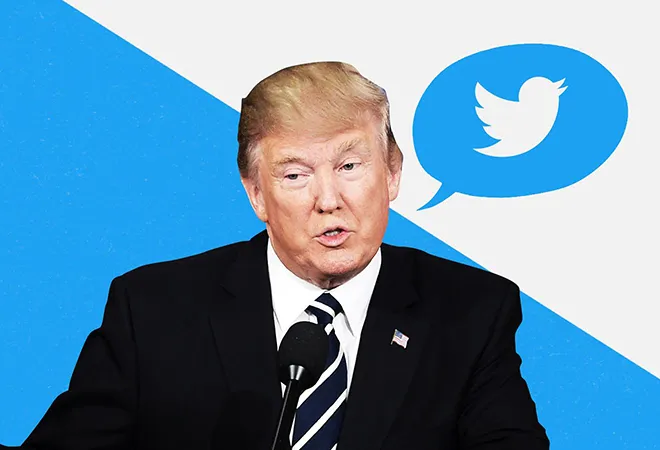-
CENTRES
Progammes & Centres
Location

Trump versus Twitter is more than just that. It’s an inevitable escalation of a conflict that goes beyond a single platform’s role in society. The question we’re asking is how America’s platform wars will implicate the global governance of our digital spaces. As part of the ORF roundtable series, Marietje Schaake, International Policy Director at Stanford University’s Cyber Policy Center and Baijayant Panda, BJP’s national vice president and spokesperson joined Dr. Samir Saran, President, Observer Research Foundation for a 60 minute conversation on our tech futures, platform wars, 5G and that elusive digital ingredient: public trust.
Digital wars are unravelling and online divisions are growing starker. There’s the pandemic and the infodemic, in parallel. There is undermining by regimes and exaggeration by regimes. Twitter flagged Donald Trump's tweets, Facebook left Trump's tweets untouched. Who was right? When you pull back from the specifics of this particular story, what does this mean for the new edifice of community standards that will be built in the digital public square? Where are we now, what is the general direction in which we are headed? How should we be thinking about this thumb stopping moment?
Marietje Schaake said she “welcomes” the ownership of power in the case of Twitter tagging Trump’s tweets and the possibility that new standards will be set which improve the quality of life and align with democratic values. Zooming out beyond the scope of Twitter, Schaake wants to see more choice for citizens and consumers and a stronger preservation of public interest.
“The question has be understood in terms of what tech companies already do to intervene in absolutely free flows of information, companies like Facebook or Instagram, or whatever, or they already have curation and ranking and prioritisation on the basis of commercial interests. As Mr. Panda has said, of course, there are sort of extremist categories like child pornography that are that are not allowed. It is truly the commercial platforms discretion to expand these categories. For example, breastfeeding is not considered acceptable even though if you look at the World Health Organization, it is recommended that women breastfeed. Now this is only one example. So I don't think we should think about the status quo as one in which these social media and tech platforms do not intervene at all and that only if and when governments, democratic or non democratic, guide them or force them to that they will. In fact, I think that if you truly believe in freedom of expression, we must argue for anchoring terms of news and corporate policies…we must actually ensure that they are as closely aligned to freedom of expression laws as they exist. And so I think the challenge is, that there is a notion, among the broader public and I've heard this all the time — that companies will only restricted by policies coming from government when in fact corporate policies are already having a huge impact and also a limiting impact on freedom of expression when taken literally and legally.”
Jay Panda thinks Twitter’s cherry picking of content to moderate is problematic to start with. No matter what standards tech platforms spin up, Panda questions the basics of whether these standards can be applied at all across vastly different cultural contexts.
“So, different communities may have different standards in India or Brazil, or even between coastal America and Midwest America. So this question is about what standard should apply. And this is really a fight about power and dominance. Polarisation was bound to lead to this. Let me flag two things that have been problematic with what Twitter is doing. They haven't applied the same standards to other people. They have not flagged leaders of terrorist organisation, for instance. They have not flagged certain authoritarian figures.So this brings up a question whether the standards are fair, whether they are uniform and whether they can be applied at all. Because Twitter has started making comments that it will take a different approach to world leaders as opposed to ordinary people. Now, is that a fair standard to apply? I'm sure many people will find problems with that. Rules change when entities become really large. Now, Section 230 was set up to encourage small firms online. When you become really large, you've seen in the past, application of laws in different countries so that they (firms) don’t have too much power. Whether it was breaking up large companies of monopolies…or take net neutrality for instance. The whole idea was that companies should not be able to dictate what you see on a priority basis. So, we will have to find answers.”
This is not the first time that a digital platform has tangled with the State, it won't be the last. The unmoderated internet, as we are seeing, can be awful and liberating in the same moment. Broadly, the debate is spiralling into two distinct themes: content moderation and the more insidious algorithms that power the user interface of these mighty companies. At least one digital platform is shifting from a mostly tepid to a more muscular response to content posted on its site. In the spaces in-between, the disinformation havoc continues. Europe, meanwhile is thinking about antitrust laws in the digital age. There’s a lot going on and we, as individual users, are in the thick of it. One bright spot: While we’re entangled with the doings of Facebook and Twitter, Google Docs is becoming the go-to social media collaborative space for protesters. Who would have thought?!
The views expressed above belong to the author(s). ORF research and analyses now available on Telegram! Click here to access our curated content — blogs, longforms and interviews.

Nikhila Natarajan is Senior Programme Manager for Media and Digital Content with ORF America. Her work focuses on the future of jobs current research in ...
Read More +